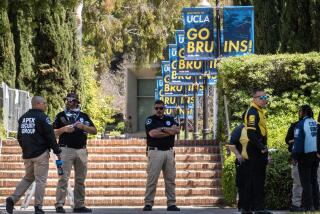Grim Realities Color How Businesses See an Increased Need for Security
- Share via
It wasn’t very long ago that green -- the color of money -- was the color that corporate executives worried most about.
These days, though, it is orange -- the color of the government’s heightened terrorism alert -- that is weighing heaviest on many of their minds.
Underscoring this grim reality is Inter-Con Security Systems Inc. of Pasadena, an enterprise whose 30-year history encapsulates the evolving nature of protection for major companies and institutions.
Simply put, before the Sept. 11 terrorist attacks, an electric power plant might erect a chain-link fence to prevent liability in case a kid on a bike rode on the grounds and had a bad spill. Today, a power plant has not only the fence but also security personnel patrolling the perimeter, plus guards at every gate and closed-circuit televisions staffed by trained personnel ready to spring into action if an intruder is spotted on the monitor.
“It used to be that companies with visitors and vendors coming and going would watch people leaving the building to prevent stealing,” says Enrique Hernandez Jr., president of Inter-Con, whose clients include State Department facilities in the U.S. and abroad, industrial giants such as General Motors Corp. and the organizers of the Academy Awards, scheduled for Sunday night. Now, he adds, “the emphasis must be on controlling access to facilities” -- in other words, keeping people out in the first place.
The need for such guardedness has only grown, with President Bush putting the nation on a clear path to war -- and, in turn, the government issuing an orange alert, signaling its increased concern about possible terrorist attacks. With that in mind, Inter-Con advised its clients Tuesday that they should prepare to disperse their employees or consider moving some work to alternative sites.
Those that should be especially worried, cautions Hernandez, are corporations that operate overseas and have “brand names that say America.”
Protection like this costs big bucks, of course -- anywhere from $400,000 to $1 million per facility, according to Hernandez. No wonder that decisions in this area no longer are made by minions. “Chief executives,” notes Hernandez, “now take responsibility for company security.”
Inter-Con is hardly alone in its sophistication. A number of highly skilled firms have emerged from an otherwise sleepy sector that includes more than 12,000 mom-and-pop companies providing night watch and routine guard services. Securitas of Sweden, the world’s largest security company with about $7 billion in annual revenue, in recent years has bought up such fabled detective agencies as Pinkerton and Burns.
Wackenhut Corp., a Palm Beach, Fla.-based security provider that is owned by Danish firm Group 4 Falck, is finding lots of interest in its Custom Protection Officer service, in which a uniformed Wackenhut employee will remain at a business full time for $50,000 or so a year. That service now provides one-third of Wackenhut’s annual revenue of $2.8 billion, a spokesman says.
Hernandez’s family-owned firm has itself expanded rapidly. It pulls in nearly $1 billion in annual revenue, up from half that level in 1999. Inter-Con has 25,000 employees.
In a way, the threatening world of today is the nightmare culmination of trends foreseen by Enrique “Hank” Hernandez, founder of Inter-Con, who served as a lieutenant in the Los Angeles Police Department in the early 1960s. He was loaned to the Justice Department, which wanted a bilingual police officer to help train Latin American cops in crowd control.
They had plenty of reason for wanting Hernandez’s assistance. Communist demonstrators had attacked U.S. embassies in Latin America and threatened a motorcade of then-Vice President Nixon in the 1950s.
Hernandez provided training for the locals and devised new methods of security, employing cameras and electronics as well as guards.
Hernandez also noticed something intriguing: In Mexico and Latin American countries, middle- and upper-class citizens required security for their everyday existence; society was less lawful and civil than in the United States at that time.
Yet Hernandez sensed similar patterns arising back at home. So when he retired from the LAPD in 1973, he founded Inter-Con.
Under his son Enrique Jr., a 44-year-old graduate of Harvard Law School, the firm has made great technological strides. To counter hijacking in Mexico, for example, Inter-Con has devised a way to immobilize trucks by remote control if they are commandeered. Inter-Con also has became one of the largest providers of security for hospitals -- guarding against the stealing of drugs and even newborn babies -- by introducing electronic surveillance and hidden sensors.
But it is more than just gizmos that have put companies such as Inter-Con in such high demand; they also tout their emphasis on recruiting and retaining high-quality personnel, including former military officers.
“This is an industry for professionals,” Hernandez says. Even guards make $15 an hour, he explains, because “you can’t hand much responsibility to a minimum-wage, minimum-skilled individual.”
The cost is tremendous. But there’s no escaping it: Coping with orange takes a lot of green.
James Flanigan can be reached at jim.flanigan@ latimes.com.
More to Read
Sign up for Essential California
The most important California stories and recommendations in your inbox every morning.
You may occasionally receive promotional content from the Los Angeles Times.










